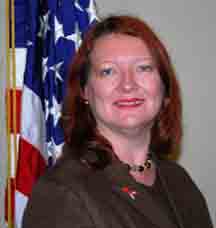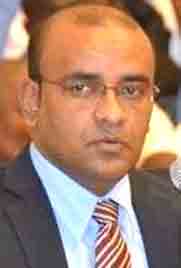A senior US envoy here was of the view in 2009 that the large investment expected from oil explorer CGX might be a carrot for President Bharrat Jagdeo to remain in office beyond his term and she also related to Washington how Jagdeo intervened to clear hurdles that the company was experiencing.
On December 12, 2009, Chargé d’Affaires Karen Williams offered the following comment to Washington after CGX officials had held a briefing with officers of the US Embassy.

“Large-scale oil production poses several challenges for both CGX and the Government of Guyana. Establishing the necessary capacity to responsibly manage oil funds is key to successful project implementation. Economically, large scale oil production is not envisioned in President Jagdeo’s Low Carbon Development Strategy and is in direct conflict with pursuing the low-carbon economy outline.
Politically, however, the large influx of foreign direct investment expected from CGX is too tempting to pass up for a poor nation and it may be a carrot for Jagdeo to remain in office longer than 2011. Rumors already abound that, instead of a third term, President Jagdeo will find a way to delay elections by one to two years,“ Williams said in the cable.
CGX’s drilling plans have seen several delays and President Jagdeo has already said that he plans to demit office at the end of his term.
The cable was based on a meeting held between CGX Director Edris K Dookie and the political and economic chiefs of the embassy on the company’s progress in developing a possible major oil field in Guyana waters.
In recent weeks there has been considerable optimism and interest following a major oil find offshore of French Guiana by Tullow Oil. Dookie told the officers that the most realistic start date for exploratory drilling was September/October 2010. This has now been deferred to later this year. Dookie told the officers it will take three to four months to drill into three geologic zones thought to contain oil: first, at 11-12,000 feet; second, at 15-16,000 feet; and third, at 19,000 feet and deeper. If everything went according to plan, CGX anticipates pushing up production over the course of five years, producing up to 300,000 barrels per day by 2015. Williams noted however that ExxonMobil contacts considering operations here had previously commented that up to 10 years might be necessary to develop a major field.
Williams said in the cable that Dookie also outlined the difficulties that CGX had endured and the role that President Jagdeo hadplayed.She related that securing the Environmental Protection Agency permit for exploratory drilling did not occur until Dookie, President and CEO Kerry Sully, and other CGX officials met with President Jagdeo on November 21, 2009. “Dookie indicated that before the meeting CGX could neither elicit response from the EPA nor make progress in acquiring a 55 acre parcel of land on the Berbice River north of New Amsterdam. But the day after meeting Jagdeo, Dookie recounts, the EPA Administrator informed him the permit had been granted and permission was granted separately to begin cadastral surveys,“ Williams related.

She said Dookie also listed several remaining challenges including securing favourable duty concessions and expedited customs clearance on imported capital equipment. Visas and work permits for skilled labour were also a concern while protecting workers and company property from pirate attacks was another.
“Dookie observed that the Guyana Defense Force (GDF) lacks an effective, properly equipped coast guard and intimated that the U.S. should strengthen the GDF Coast Guard,“ she said.
Dookie also pointed to concerns about neighbouring Suriname and Venezuela. According to Dookie, there is pressure from within the GoG to prevent Venezuelan participation of any kind at Eagle Deep drilling
site. Suriname had thwarted the initial drilling attempt in 2000 by using its gunboats to chase away the CGX rig.
Dookie also spoke about plans for the 55 acres which CGXwas leasing for its operations on the East Bank of the Berbice River. Phase I of facility includes a 350’x500’ storage area and a 150’
concrete pier. Phase II includes expanding the facility as necessary as exploratory drilling moves into production.
The pier would require a draught of at least 30 feet to accommodate large
ships. CGX, she said, estimates spending up toUSD350 million on infrastructure, including the rig, by the time full production is reached in 2015 or beyond.
The government has recently played up the second phase of the 55-acre project as a deep sea port facility. This came after it was announced that Suriname was building a deep sea facility in collaboration with a Chinese company. Guyana has long indicated an interest in a deep sea port but there has been minimal progress towards this.
In August this year, CGX provided an update on its operations on the East Bank of Berbice.
The company noted then that it was in the process of completing staging facilities to be used in the assistance and logistics for the drilling of the Eagle Well.
To date, it said the company had fenced in the yard, constructed an office and sanitary services, installed two fuel tanks that can accommodate 20,000 litres and completed an internal access road with crusher run and sand filling.
The company has also started work on a two kilometre access road. So far, it said, for the first half of this year, it has spent US$2.3M with respect to a logistics yard and expenditures on a staging facility.
The logistics yard was purchased in 2010 for US$385,000. The company signed a 50 year lease for approximately 55 acres on the Berbice River.








